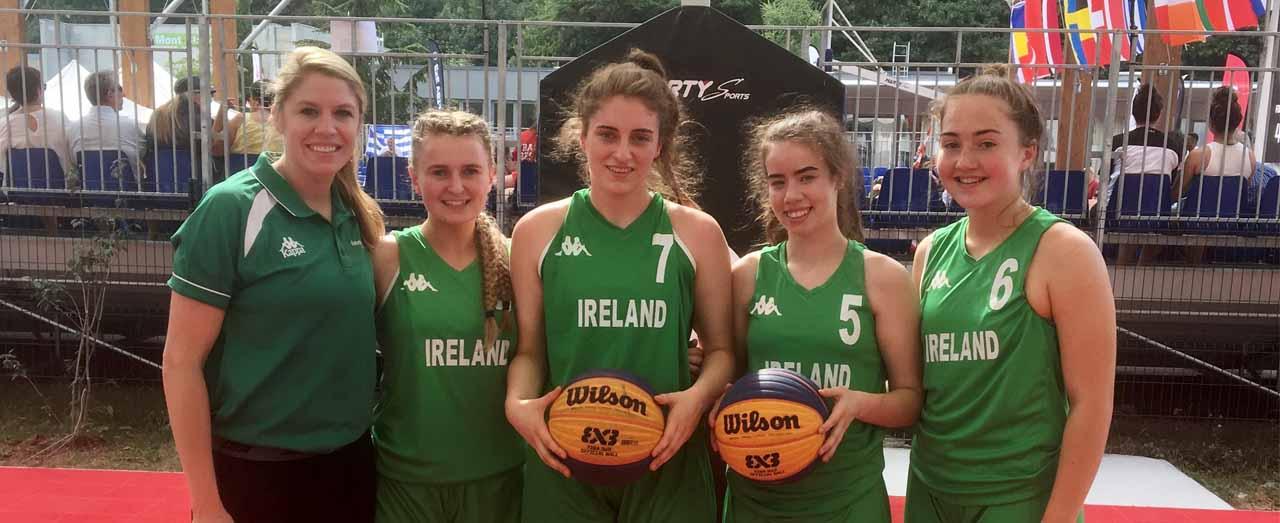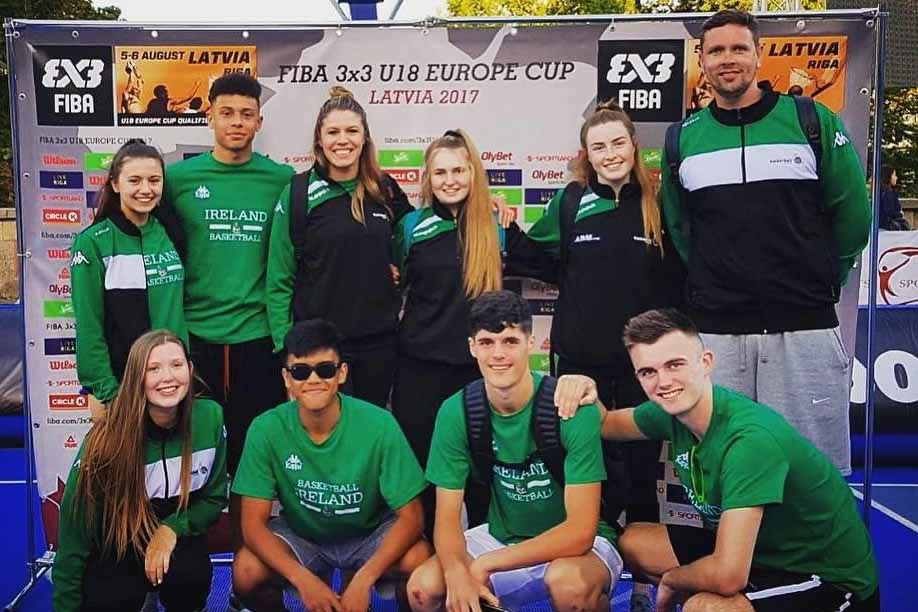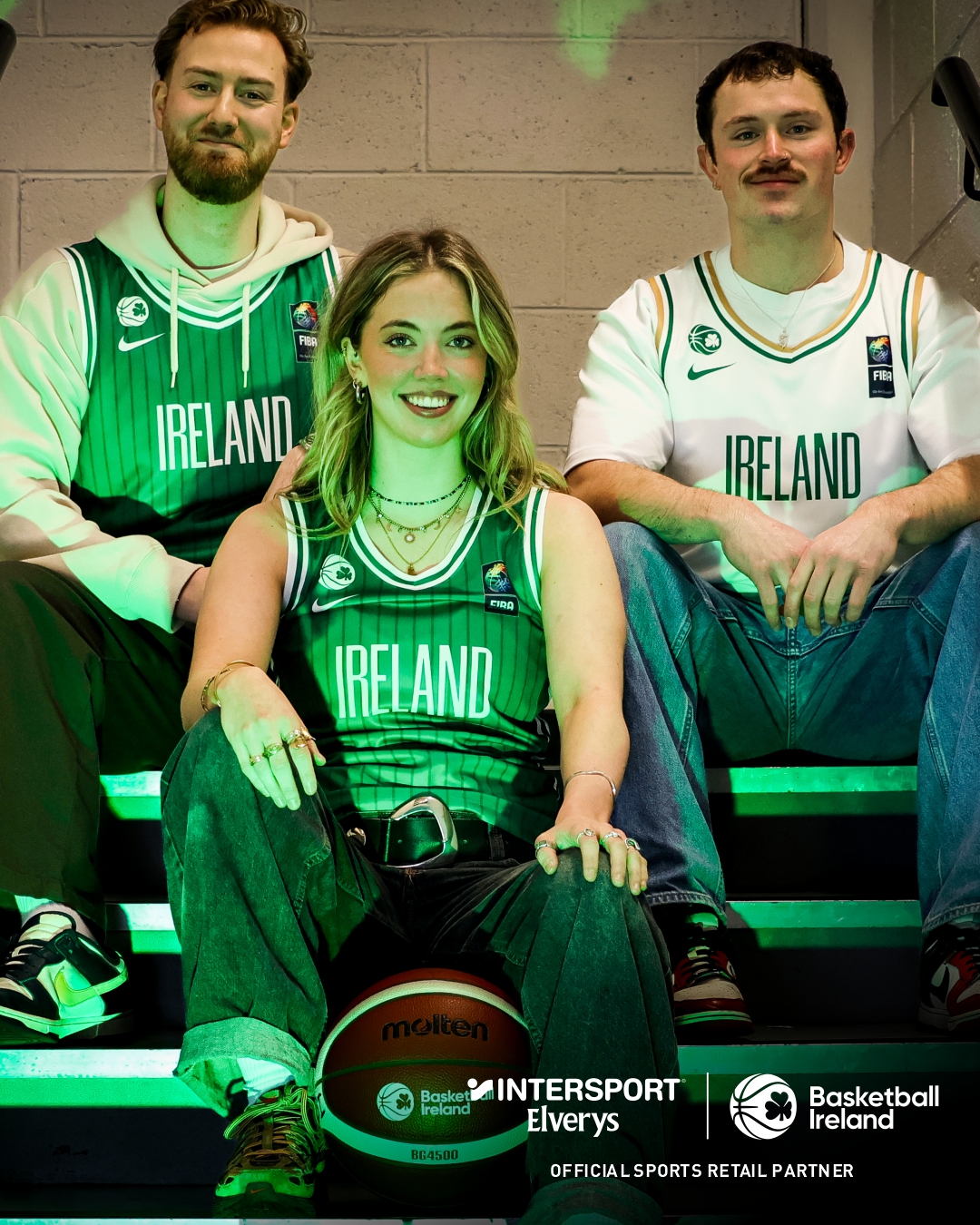Meagan Hoffman - Liffey Celtics BC

Head Coach: Liffey Celtics Women’s Div 1 team
Interview
Can you talk us through your playing background?
I grew up playing basketball in the States. After high school, I received a scholarship to play at Adam’s State University (NCAA Div II) where I played for 4 years, and then went on to play professionally in Europe from 2005-2016. In Europe, I played basketball in Iceland (Breidablik), Spain (Alvargomez), the UK (Rhondda Rebels & UWIC), and here in Ireland (DCU Mercy & Liffey Celtics). I also was involved in the Great Britain Senior Women’s National team from 2006-2011.
How did you get involved in coaching?
I’ve always coached in various basketball camps while in college and in my professional career, but it wasn’t until I came to Ireland that I really got involved in coaching and taking underage teams while playing for DCU Mercy and Liffey Celtics.
What kind of teams have you coached over the years?
I coached underage teams in DCU Mercy and Liffey Celtics (U16, U17, U18) and also coached schools basketball at all ages in Loreto College, St. Stephen’s Green. I coached the Irish U18 Women’s 3x3 team in 2017 & 2018, and now am currently coaching the Liffey Celtics Div 1 team who I have been with for the last 3 years.
Who would you say was a role model for you as a coach and why?
When I was younger, I always looked up to Pat Summit. She was a true competitor, and an incredibly influential female coach who paved the way for women’s basketball in so many ways. So without a doubt she would have been a role model for me when it came to coaching. I think beyond that, there have been a lot of coaches throughout my career that have been role models and have inspired me in various ways and ultimately shaped me into the coach I am today.
What is the most important thing for you when coaching younger/teenage boys and girls?
I think for me, there are two things. Firstly, teaching them the fundamentals is so important. You see far too many players who were never taught some of the most basic fundamentals correctly at a young age, and it’s so hard to try and re-teach those and get rid of the bad habits they’ve picked up when they’re older. So, teaching the fundamentals at a young age is vital. Secondly, I think you have to show them that you care. Getting kids involved in sports is one thing but keeping them involved can be the hardest part as they get older. If you show them that you care about them as a player and their development, that is what will help keep them coming back day in and day out.
Have you any tips you'd like to share on keeping girls engaged in sport - particularly at the 14-18 year old age group?
Again, I think that you have to show that you care, that you value them within your team, and that you’re invested in each and everyone of them. I think girls at this age need coaches who are encouraging, supportive and are able to create a positive environment that they want to be a part of. And this doesn’t mean that you can’t be tough on them at times, or push them, or that you have to be less competitive in your approach to coaching, but it’s about also trying to understand and relate to them. There are so many pressures that girls in this age group face outside of the basketball court, so for me, when they step onto the court, I want them to know that I am there for them, and for the team as whole. Being involved in a team sport teaches you so many life-long lessons that you will use far beyond your basketball career (teamwork, competitiveness, confidence, commitment, hard work, sacrifice etc.), so keeping them involved in sport will benefit them far beyond their basketball career. That’s what we need to always remember as coaches, and hopefully also what we can help the young players realise.
Do you have a favourite drill you use for younger players to keep them engaged in the training session and if so, what is it?
I have a few drills that I love to implement into training sessions, obviously dependent on what we’re working on/focusing on at the time. But one of my favourite drills is ‘the second movement’ drill. It’s a half court drill where you have teams of 4 players. On offense, the 4 players are spread out along the 3-point line to start; on defense, you have 3 players starting in the key, and 1 player on the baseline as the passer. The passer passes the ball out to one of the offensive players and it is live 4v3 from there. After a score, defensive rebound or steal, the ball goes out to the passer; offense has to get outside the 3-point line, and then it’s thrown out and live play again. You play for one minute continuously, and then switch offense to defense, usually for 4 rounds. The team with the most scores at the end wins. The focus of this drill on offense is quick thinking, off the ball movement, and to try and get quick scores. The focus on defense is communication and rotation as you are one man down. It’s great drill, extremely competitive, and one that the players always enjoy.
Any tips you would like to give to young coaches who are starting out?
Be a sponge when it comes to learning- from other coaches, from books and online resources, from watching basketball, etc. Don’t be afraid to put yourself out there and get involved wherever you can.
Have a coaching philosophy and an idea of the type coach you want to be and style of basketball you want to play. For example, I’m all about defense, and no matter what players I have in front of me, I want to be known as a tough defensive team.
Be adaptable and open to change - you may have brilliant offenses that worked well with a team in a previous year, but that doesn’t mean it will work for every team; know your personnel and coach the players you have in front of you.
When you first stepped up to National League/International level, were you nervous about the step up and how did you deal with that if so?
I think when I was first asked to take the Irish U18 3x3 team, I was a little hesitant and nervous. Not because I didn’t think I was capable of doing it, but mainly because I hadn’t ever taken a program on my own like this, and also the 3x3 game was just really starting to get going. I knew the game and the rules, had played in various tournaments myself during the summers in the States and here in Ireland, but I had never really coached it. Putting together trials, making cuts, creating 3x3 training sessions, etc. was all new to me. But I fully embraced the challenge and I absolutely loved every second of it. It was such an amazing experience for me as a coach and for all the girls that were a part of it for those 2 summers, and I’m so glad that I stepped out of my comfort zone and took on the challenge.

What would you say to other female coaches who are considering moving up a level in their coaching careers?
I would say that if you’re wanting to do it, then you have to go for it! Sometimes the barriers we face are not the ones that others place on us, but the ones we put on ourselves. Have the confidence & self-belief in yourself and don’t be afraid to step outside of your comfort zone. If you don’t try, you’ll never know!
How do you measure the success of a training session?
I’m someone who has a practice plan for each session, with an idea of the objectives & goals that I want to get out of my session (be it various skills, tactics, reads within plays, etc.). I like to work these through phases and build on them individually and through small-sided games and then ultimately into match play. I feel we have had a successful session when we’ve worked through those skills, and then they transfer into the 5v5 setting in training, that is without a doubt a success! I also think it’s a successful session if the girls are focused, competitive and there’s high energy throughout- having all three of those things in a session is key.
How do you measure success in broader terms?
I think for me, success is measured through the ability to reach your potential, and the process within that. At the start of the season, I have realistic goals for what I think the team is capable of achieving that year. Currently with my Liffey Celtics team, we’ve won the Dublin Cup the last 2 years, and that was a realistic goal that we wanted and felt we could achieve at the start of the season. And while I see winning those Cups as a huge success, that to me is actually just the result. We were able to reach our potential through the successful process- everything that led up to that moment to make it possible (the hard work, the dedication, the progress and development individually and as a team, the performances in training and games, etc.). I think if you are able to achieve your potential as a team, and able to recognise the process behind that, then that’s a success (and it’s something that will vary each year, depending on the team you have).
How important do you think it is for coaches to keep learning and developing regardless of level of experience?
I think it’s extremely important! Just like with any job/career, continual professional development is key. We’re lucky in this day and age to have so many resources available to us online; as coaches we should always try to utilise these resources to better ourselves and continue to educate ourselves on the game.
What changes would you like to see in basketball coaching in Ireland in the future?
I would love to see more female coaches in International roles, Senior Leagues and across the board in general. I think it’s important that young females not only have female role models in those positions, but also to see that there are pathways for them beyond their playing career.
What is the most valuable lesson you have learned as a player?
I think the most valuable lesson I have learned as a player is how important hard work, determination and perseverance are, and how they are key in being successful. From growing up in a small mountain town in Colorado, to playing professionally in Europe, I know without a doubt if I didn’t have those 3 things throughout my life, I wouldn’t have ever accomplished or got to where I did in my basketball career.
What is the most valuable lesson you have learned as a coach?
One of the most valuable things I’ve learned as a coach is that you don’t have to necessarily be liked by all your players, but you need to have the respect of all your players. I think when I first started coaching, I wanted to ensure that all my players liked me, but I’ve realised that that’s not what is most important. It’s about earning and having the respect of your players as a coach, and also having it for them in return. When there is a mutual respect between the coach and the player, it creates trust, and that is what then makes for a strong coach-athlete relationship.

